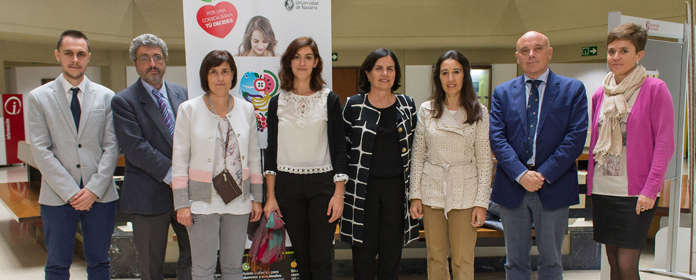"Hunger is a reality that could be ended if the political will existed".
Carmen Luna Corpas, FAO Spain consultant, participates in a roundtable that opens the Healthy Eating Week at the University.

The School of Pharmacy and Nutrition of the University of Navarra has inaugurated the Healthy Eating Week with a roundtable in which participated, among other speakers, Carmen Luna Corpas, consultant of FAO Spain, who said that hunger in the world "is a reality that could end if there were political will to do so".
As the expert recalled, this year the FAO will dedicate World Food Day -next Monday, the 16th- to migratory movements and their relationship with the lack of food security. "According to the latest report on 'The State of Food Security and Nutrition in the World', 850 million people live affected by hunger and 6 out of 10 hungry people come from countries in conflict." "This fact has been aggravated by the fact that wars and conflicts have broken out in recent years and are dragging on over time," the consultancy emphasized.
As he explained, the impact of these clashes on food security can be direct or indirect: "Direct in the form of destruction of farms or food reserves, and indirect when food systems or markets are disrupted and commodity prices rise. These factors are also aggravated by climate change, since it is precisely the regions most susceptible to climate disruption that are the most dependent on agriculture and, therefore, the most fragile in terms of food security."
In this regard, the expert stressed that ending hunger by 2030 - the first of the 17 Sustainable Development Goals development promoted by the UN - requires a profound change "on the part of our international, national and regional leaders, who have a high responsibility in this subject, but also of citizens in general. We all must and can do our part". In the case of the general population, Luna Corpas pointed out as daily actions that we should introduce "waste less food, eat less animal protein, more legumes, invest in small farmers and support sustainable food production".
"511,800 Spaniards suffer from severe food insecurity in Spain."However, food insecurity also affects the so-called "developed" countries: "In Spain, 511,800 people suffer from severe food insecurity (1.1% of the population). In this case, the main cause is economic , and it has been reinforced as a result of the crisis and the increase in socio-economic inequalities, accompanied by a weakening of protection systems," says the FAO expert.
Along with Carmen Luna, this roundtable was attended by Aquilino García, board member national food of committee General de Colegios Oficiales de Farmacéuticos; Carlos Medina, professor at the University Isabel I; Mª Puy Portillo, professor at the University of the Basque Country; Adela López de Ceráin, dean of the School of Pharmacy and Nutrition; and Alfredo Martínez Hernández, Full Professor of Nutrition and member of CIBEROBN.
In addition to this event, the University of Navarra's Healthy Eating Week will be completed with two sessions on how to correctly interpret food labeling -at position by dieticians and nutritionists Susana Santiago and Elena Gascón- and information points at position by experts in the different cafeterias of the academic center on the occasion of World Food Day, next Monday, October 16, at framework of the campaign "For a healthy meal, you decide", promoted by the University of Navarra to encourage healthy lifestyle habits in the university environment.




